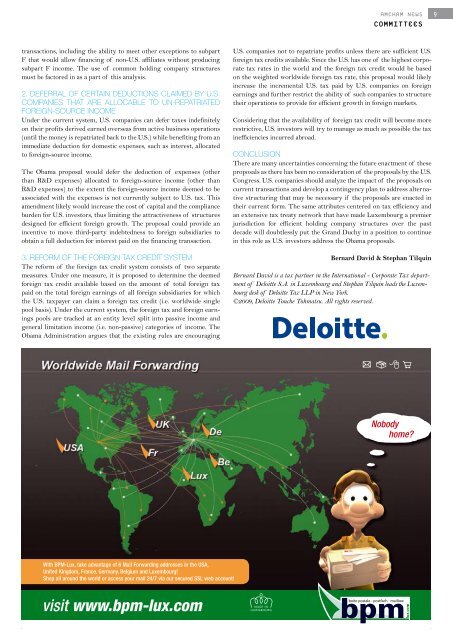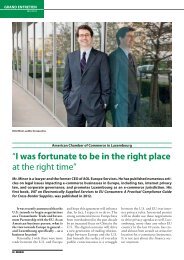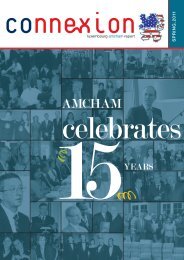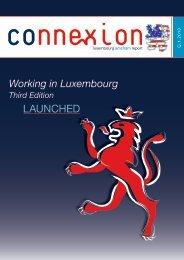Luxembo - The American Chamber of Commerce Luxembourg
Luxembo - The American Chamber of Commerce Luxembourg
Luxembo - The American Chamber of Commerce Luxembourg
- No tags were found...
You also want an ePaper? Increase the reach of your titles
YUMPU automatically turns print PDFs into web optimized ePapers that Google loves.
AMCHAM NEWS<br />
COMMITTEES<br />
9<br />
transactions, including the ability to meet other exceptions to subpart<br />
F that would allow financing <strong>of</strong> non-U.S. affiliates without producing<br />
subpart F income. <strong>The</strong> use <strong>of</strong> common holding company structures<br />
must be factored in as a part <strong>of</strong> this analysis.<br />
2. Deferral <strong>of</strong> certain deductions claimed by U.S.<br />
companies that are allocable to un-repatriated<br />
foreign-source income<br />
Under the current system, U.S. companies can defer taxes indefinitely<br />
on their pr<strong>of</strong>its derived earned overseas from active business operations<br />
(until the money is repatriated back to the U.S.) while benefiting from an<br />
immediate deduction for domestic expenses, such as interest, allocated<br />
to foreign-source income.<br />
<strong>The</strong> Obama proposal would defer the deduction <strong>of</strong> expenses (other<br />
than R&D expenses) allocated to foreign-source income (other than<br />
R&D expenses) to the extent the foreign-source income deemed to be<br />
associated with the expenses is not currently subject to U.S. tax. This<br />
amendment likely would increase the cost <strong>of</strong> capital and the compliance<br />
burden for U.S. investors, thus limiting the attractiveness <strong>of</strong> structures<br />
designed for efficient foreign growth. <strong>The</strong> proposal could provide an<br />
incentive to move third-party indebtedness to foreign subsidiaries to<br />
obtain a full deduction for interest paid on the financing transaction.<br />
3. Reform <strong>of</strong> the foreign tax credit system<br />
<strong>The</strong> reform <strong>of</strong> the foreign tax credit system consists <strong>of</strong> two separate<br />
measures. Under one measure, it is proposed to determine the deemed<br />
foreign tax credit available based on the amount <strong>of</strong> total foreign tax<br />
paid on the total foreign earnings <strong>of</strong> all foreign subsidiaries for which<br />
the U.S. taxpayer can claim a foreign tax credit (i.e. worldwide single<br />
pool basis). Under the current system, the foreign tax and foreign earnings<br />
pools are tracked at an entity level split into passive income and<br />
general limitation income (i.e. non-passive) categories <strong>of</strong> income. <strong>The</strong><br />
Obama Administration argues that the existing rules are encouraging<br />
U.S. companies not to repatriate pr<strong>of</strong>its unless there are sufficient U.S.<br />
foreign tax credits available. Since the U.S. has one <strong>of</strong> the highest corporate<br />
tax rates in the world and the foreign tax credit would be based<br />
on the weighted worldwide foreign tax rate, this proposal would likely<br />
increase the incremental U.S. tax paid by U.S. companies on foreign<br />
earnings and further restrict the ability <strong>of</strong> such companies to structure<br />
their operations to provide for efficient growth in foreign markets.<br />
Considering that the availability <strong>of</strong> foreign tax credit will become more<br />
restrictive, U.S. investors will try to manage as much as possible the tax<br />
inefficiencies incurred abroad.<br />
Conclusion<br />
<strong>The</strong>re are many uncertainties concerning the future enactment <strong>of</strong> these<br />
proposals as there has been no consideration <strong>of</strong> the proposals by the U.S.<br />
Congress. U.S. companies should analyze the impact <strong>of</strong> the proposals on<br />
current transactions and develop a contingency plan to address alternative<br />
structuring that may be necessary if the proposals are enacted in<br />
their current form. <strong>The</strong> same attributes centered on tax efficiency and<br />
an extensive tax treaty network that have made <strong>Luxembo</strong>urg a premier<br />
jurisdiction for efficient holding company structures over the past<br />
decade will doubtlessly put the Grand Duchy in a position to continue<br />
in this role as U.S. investors address the Obama proposals.<br />
Bernard David & Stephan Tilquin<br />
Bernard David is a tax partner in the International - Corporate Tax department<br />
<strong>of</strong> Deloitte S.A. in <strong>Luxembo</strong>urg and Stephan Tilquin leads the <strong>Luxembo</strong>urg<br />
desk <strong>of</strong> Deloitte Tax LLP in New York.<br />
©2009, Deloitte Touche Tohmatsu. All rights reserved.<br />
Nobody<br />
home<br />
With BPM-Lux, take advantage <strong>of</strong> 6 Mail Forwarding addresses in the USA,<br />
United Kingdom, France, Germany, Belgium and <strong>Luxembo</strong>urg!<br />
Shop all around the world or access your mail 24/7 via our secured SSL web account!<br />
visit www.bpm-lux.com<br />
Aff_mail_forward_A4_UK.indd 3 22/10/08 15:39:17















